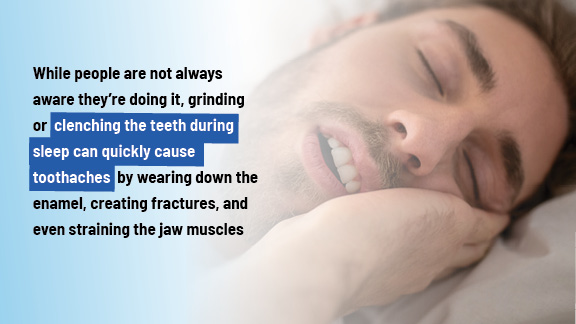A dull ache or a sharp stab? Just a leftover popcorn kernel from Saturday night or an old filling that finally cracked? Toothaches come in all shapes and sizes, from mild sensitivity (that’s really more of an annoyance) to severe, eye-watering pain that impacts nearly every activity.
So, how long will the pain persist? The short answer: Toothaches can last mere minutes to days, weeks or longer, and it really depends on the underlying cause of the toothache. which also determines how quickly someone should seek dental treatment. Keep in mind that pain that lasts more than two days is not normal and is a sign to call the dentist.
Common Causes of Toothaches
Popping some ibuprofen might provide some temporary relief for a toothache, but to fix the root cause of the pain (and prevent further complications), it helps to first understand what’s causing the toothache in the first place. Your dentist can uncover the root source of your toothache, but some common causes include:
Cavity: More than a fourth of U.S. adults have untreated cavities, which is why they’re one of the most common culprits of toothaches. Cavities develop when bacteria produce acids that erode the tooth’s enamel, which creates a hole in the tooth. If left untreated, cavities can penetrate deeper layers of the tooth, causing significant pain.
Tooth abscess: Occurring at the root of the tooth or between the gums and the tooth, a dental abscess is a severe infection that often causes throbbing pain, swelling, fever, and a bad taste in the mouth. See the dentist as soon as possible to prevent the infection from spreading.
Gum disease: Also known as periodontal disease, this is another major cause of many toothaches. Gum disease usually starts when the gums become inflamed from plaque buildup, a condition known as gingivitis. If not addressed, it can lead to more pain and possibly tooth loss.
Cracked or damaged tooth: Fractures in a tooth can cause sharp jabs of pain, especially when chewing or biting, and are often the result of an injury, grinding of the teeth, or simply biting on something hard. Depending on how bad the damage is, it may need bonding, a crown, or even a root canal.
Grinding the teeth: While people are not always aware they’re doing it, grinding or clenching the teeth during sleep can quickly cause toothaches by wearing down the enamel, creating fractures, and even straining the jaw muscles.
Loose or broken fillings or crowns: Got a mouth full of aging fillings or crowns? That old dental work can become loose or cracked over time, exposing the sensitive inner layers of the tooth to bacteria and food particles (and exposing the mouth to plenty of pain).

Growing wisdom teeth: If a wisdom tooth is pushing through the gums, it can cause food to get stuck under the gums and potentially cause an infection (and pain).
Impacted wisdom teeth – Even worse, those wisdom teeth can instead become partially or completely stuck in the jaw or gums, which can cause all kinds of pain, as well as infection and even gum disease.
Sinus infection: Sometimes a toothache doesn’t have anything to do with teeth! Sinus infections can sometimes create pressure and pain in the upper teeth, so if the toothache is coming at the same time as other sinus-related symptoms, it might be worth checking with a doctor.
When to Seek Treatment for a Toothache
Unfortunately, it’s not always easy to tell what’s causing a toothache. So, do you wait it out or make an appointment? Evaluate the symptoms to help make a decision on next steps:
Seek immediate help if…
Head to the nearest emergency room if any of the following are present:
- Unbearable pain not relieved by pain medicines
- Any swelling near the eye
- A knot in the jaw
- A fever of 101 F or higher
- Bleeding in the mouth that won’t stop
Call the dentist when…
With most toothaches, the longer someone waits to seek professional care, the worse it’s going to get. If any of the following symptoms are present, go ahead and set an appointment:
- Pain for more than two days
- Pain when biting or chewing
- Headaches related to the toothache
- Swelling of the face and jaw
- A bad taste in the mouth
- Persistent tooth sensitivity
Need to find a dentist near you? Make an appointment online today!
Don’t Take a Toothache Lightly
Bodily aches and pains are normal and quite common, but toothaches usually tell a different story. The wait-and-see approach might be tempting, and certainly some mouth pains—such as irritated gums from biting something hard or sharp, for example—can go away on their own. But toothaches that stem from the teeth themselves almost always indicate a larger issue and need the attention of a dental professional.
If a toothache is the result of a dental infection, that bacteria can spread outside the tooth and into the gums and jaw, and eventually into the rest of the body through the blood. Suddenly, that toothache has become a much more serious problem.
While it might be tempting to see if a toothache will feel better on its own, the smartest path is the better-safe-than-sorry one: Seek treatment from a dental professional. Not only will the visit help ease the pain, it could also prevent serious complications in the future. That’s pain relief and peace of mind.
[CTA]


